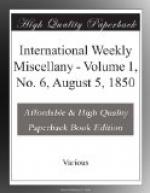Once more Anielka was alone in the world. Despite all the honors and blandishments of her position, the old feeling of desolateness came upon her. The new shock destroyed her health. She was unable to appear on the stage. To sing was a painful effort; she grew indifferent to what passed around her. Her greatest consolation was in succoring the poor and friendless, and her generosity was most conspicuous to all young orphan girls without fortune. She had never ceased to love her native land, and seldom appeared in society, unless it was to meet her countrymen. If ever she sang, it was in Polish.
A year had elapsed since the death of the Signora Teresina, when the Count Selka, a rich noble of Volkynia, at that time in Vienna, solicited her presence at a party. It was impossible to refuse the Count and his lady, from whom she had received great kindness. She went. When in their saloons, filled with all the fashion and aristocracy in Vienna, the name of Giovanna was announced, a general murmur was heard. She entered, pale and languid, and proceeded between the two rows made for her by the admiring assembly, to the seat of honor beside the mistress of the house.
Shortly after, the Count Selka led her to the piano. She sat down before it, and thinking what she should sing, glanced round upon the assembly. She could not help feeling that the admiration which beamed from the faces around her was the work of her own merit, for had she neglected the great gift of nature—her voice, she could not have excited it. With a blushing cheek, and eyes sparkling with honest pride, she struck the piano with a firm hand, and from her seemingly weak and delicate chest poured forth a touching Polish melody, with a voice pure, sonorous, and plaintive. Tears were in many eyes, and the beating of every heart was quickened.
The song was finished, but the wondering silence was unbroken. Giovanna leaned exhausted on the arm of the chair, and cast down her eyes. On again raising them, she perceived a gentleman who gazed fixedly at her, as if he still listened to echoes which had not yet died within him. The master of the house, to dissipate his thoughtfulness, led him toward Giovanna. “Let me present to you, Signora,” he said, “a countryman, the Count Leon Roszynski.”
The lady trembled; she silently bowed, fixed her eyes on the ground, and dared not raise them. Pleading indisposition, which was fully justified by her pallid features, she soon after withdrew.
When on the following day Giovanna’a servant announced the Counts Selka and Roszynski, a peculiar smile played on her lips, and when they entered, she received the latter with the cold and formal politeness of a stranger. Controlling the feelings of her heart, she schooled her features to an expression of indifference. It was manifest from Leon’s manner, that without the remotest recognition, an indefinable presentiment regarding her possessed him. The Counts had called to know if Giovanna had recovered from her indisposition. Leon begged to be permitted to call again.




